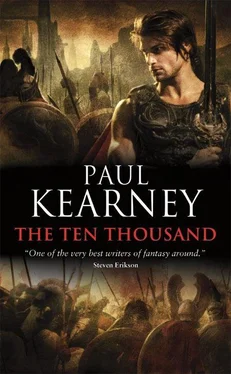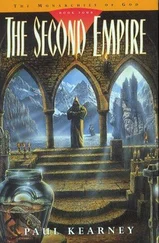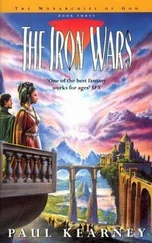Paul Kearney - The ten thousand
Здесь есть возможность читать онлайн «Paul Kearney - The ten thousand» весь текст электронной книги совершенно бесплатно (целиком полную версию без сокращений). В некоторых случаях можно слушать аудио, скачать через торрент в формате fb2 и присутствует краткое содержание. Жанр: Фэнтези, на английском языке. Описание произведения, (предисловие) а так же отзывы посетителей доступны на портале библиотеки ЛибКат.
- Название:The ten thousand
- Автор:
- Жанр:
- Год:неизвестен
- ISBN:нет данных
- Рейтинг книги:5 / 5. Голосов: 1
-
Избранное:Добавить в избранное
- Отзывы:
-
Ваша оценка:
- 100
- 1
- 2
- 3
- 4
- 5
The ten thousand: краткое содержание, описание и аннотация
Предлагаем к чтению аннотацию, описание, краткое содержание или предисловие (зависит от того, что написал сам автор книги «The ten thousand»). Если вы не нашли необходимую информацию о книге — напишите в комментариях, мы постараемся отыскать её.
The ten thousand — читать онлайн бесплатно полную книгу (весь текст) целиком
Ниже представлен текст книги, разбитый по страницам. Система сохранения места последней прочитанной страницы, позволяет с удобством читать онлайн бесплатно книгу «The ten thousand», без необходимости каждый раз заново искать на чём Вы остановились. Поставьте закладку, и сможете в любой момент перейти на страницу, на которой закончили чтение.
Интервал:
Закладка:
“That’s the Empirion,” Gasca said, pointing. “I’ve heard of it. Gestrakos himself lectured there, back before my city had even been founded.” This was a white dome, the sun blazing off it and the golden statue that surmounted it. The structure looked like some lost element of a dream brought to earth; it did not seem that its foundations could be planted on the same ground that bore their feet.
Handcarts rattled by them in convoy, bearing all manner of foodstuffs. Boys hauled them, while their fathers or elder brothers walked alongside, quirting the fingers of the avaricious with olive-wood wands. Machran had a vast hinterland about it, some of the richest soils in the Macht. It was famed for its olives, its figs, and its wine. The only place in the Harukush where the stuff did not have to be sweetened with pine resin, it was said.
“All these people. There’s the whole Gosthere Assembly here in this one street. But I see no scarlet cloaks,” Gasca said. “Where might all the mercenaries be found?”
“We should ask, I suppose,” Rictus said. But he stood motionless, strangely intimidated by the great city, the teeming crowds who afforded him not so much as a greeting or a glance, but who all, it seemed, had somewhere important to be.
“What say you we wander and let our feet have their say?”
“A fine idea,” Gasca said sourly, “for those not bowed under the weight of a panoply and carrying thread stitched in their leg.”
“Give me your shield then. We’ll hobble at any pace you care to set.”
“A lame soldier,” Gasca said, handing over his father’s shield. “What a prize I’ll be for some centurion to sign up.”
“It’s a good gash. It’ll heal quick. Here; look at mine.” Rictus lifted up the hem of his filthy chiton so that Gasca could see the purple scar on his ribs. It was oozing clear fluid and looked only half-healed.
“How long have you had that?” Gasca asked, shocked.
“Long enough to grow tired of it. Come; let’s find someone who knows about the hiring of soldiers. This place is making me weary already.”
They forged a pass through the press, twigs in the millrace. Rictus led the way, using the blunt bowl of the shield to shove the unwary out of his path. It helped that both of them were tall, raw-boned men of the inner mountains. Here, the Macht as a people were shorter and darker of hair and skin. The women were very pretty though, and they did not veil their faces in public as many of the mountain folk did, but strode about the streets as freely as any man, sometimes showing their arms and legs as well. In among the foot-walkers and cart-haulers there were also closed boxes with curtained windows, carried by men on poles. Rictus wondered what they contained, until he saw one curtain twitched aside and a fat white-faced woman shouted abuse at her bearers, her thick fingers alight with rings. He broke into a laugh, for he had never seen anyone borne about in a box before.
It was Gasca who had the best view about them, he being taller than almost every other head in the street. He tugged Rictus to a halt in the middle of a broad, column-lined thoroughfare. On either side of them there was a clangour of metal on metal, for amid the columns were scores of one-man shops, each with a blackened smith hammering out metal on small anvils before which they knelt cross-legged. These were not farriers, or armourers, but silversmiths, and their hammers tapped out intricate designs on argent sheets which were to become some fripperies to ornament a rich man’s house.
“Look, Rictus-up front. Do you see him?”
Rictus leaned on his spear-the butt was becoming splintered-and peered through the coursing crowds. A black shape, like a shadow cast on a bright day.
“A cursebearer. What of him?”
“I’ve never seen one before.”
“Really? A sheltered life you’ve led.”
“If my eyes are right, he wears scarlet too-at least I think so. We should speak to him.” He paused. “Can we speak to him? Can one do that?”
“He’s not a god, just a man who inherited his father’s harness. Come; if he’s truly wearing scarlet then we must have a talk.”
“Where did you see a cursebearer before?” Gasca demanded, a little put out at Rictus’s non-excitement.
“We had maybe half a dozen of them in Isca, the mora commanders, mostly.”
They pushed through the crowd none too gently, and received angry glances. “Strawheads!” someone called out, the ancient insult. Rictus smiled at the shouter and saw him blench, then kept going, but using the shield with a little more gentleness. Along his side of his chiton the blood was expanding in little circles, and he had sweat shining on his forehead.
“Sir-a word if we might!” he called out, for their quarry was getting too far ahead of them, people making way for the black armour.
The cursebearer halted in his tracks, turned round. He was a lowlander, shorter than them, middle-aged, with a peppery beard and deep-hollowed eyes. He had a scarlet cloak hung on one shoulder, the end of which was wrapped around his left forearm. No weapons of any kind. The man did not speak, but looked Rictus and Gasca up and down appraisingly, as a man would upon buying a horse. The two of them stood silent before him, breathing through their mouths, feeling the appraisal, lost for any more words.
The cursebearer saw two tall boys who were almost men. They might have been brothers. Both were light-skinned and fair of hair, the colouring of the inner mountains. One had grey eyes, the other blue. The blue-eyed fellow was broader, heavier, and had an open, friendly face. Grey-eyes looked underfed and ill-rested. In his glance there was some knowledge of the world, hard come by.
“What is this word you want?” the cursebearer asked. He had thick eyebrows, black as soot, and they moved more than his mouth, which was a thin-lipped gash in his beard with bad teeth behind it.
It was Rictus who must needs reply. Gasca was still staring at the black cuirass which the man wore. It seemed to soak up the very daylight, a midnight black so lightless it appeared a hole in the fabric of the afternoon. This was the Curse of God, one of the ancient armours which dated back to the origins of the Macht as a people. None knew how they had been created, but the legends said that Gaenion the Smith had made a wager with God Himself, betting that he could fashion a darkness which not even his wife’s gaze could penetrate. His spouse was Araian, the lady of the sun, and she was both an inquisitive and indolent creature. When she rose from her bed her eyes saw all things, and when she left the skies of Kuf in the evenings she would tell God Himself of the day’s doings.
Gaenion won his wager, but God took the black stuff he had forged and gave it to Antimone, Goddess of the Veil, for she was enamoured of darkness, and her two sons, Phobos and Haukos, loved to ride the horses of the air through the sky when Araian had left it for her bed.
Antimone wove Gaenion’s hammered darkness into a chiton with which to clothe the first man of the Macht, whom God had set down upon the surface of Kuf naked and afraid. Antimone, in pity, gave this first man, whose name was Ask, the chiton to protect him, for Gaenion’s fabric, though light and flexible, was more impenetrable than stone. When God realised what Antimone had done, He was angry, for He had intended that Ask and his kind should treat the other denizens of the world with respect, and show them courtesy through fear of their own vulnerability. But now Ask was unafraid, with Antimone’s Gift to clothe him, and he set out to master the creatures of Kuf which God had created. And so, through Antimone’s pity, Creation itself had been set awry. So God cursed the black armour of Antimone, and stirred up the hearts of all the other races of Kuf against Ask and his people. The Macht would be warriors without compare, He decreed, but they would never know peace, and they would have need of their black armour over the course of the world’s turning, for they would pay in blood for their desire to master the earth.
Читать дальшеИнтервал:
Закладка:
Похожие книги на «The ten thousand»
Представляем Вашему вниманию похожие книги на «The ten thousand» списком для выбора. Мы отобрали схожую по названию и смыслу литературу в надежде предоставить читателям больше вариантов отыскать новые, интересные, ещё непрочитанные произведения.
Обсуждение, отзывы о книге «The ten thousand» и просто собственные мнения читателей. Оставьте ваши комментарии, напишите, что Вы думаете о произведении, его смысле или главных героях. Укажите что конкретно понравилось, а что нет, и почему Вы так считаете.












